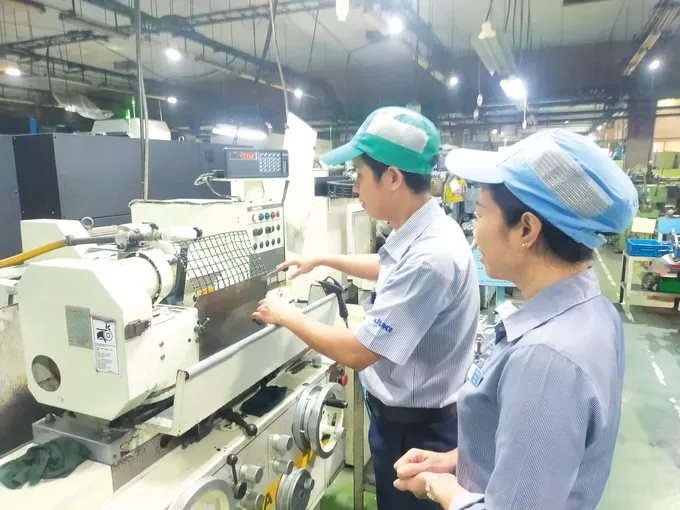
Fueling deeper commitment to business
A proposed 7.2-percent average increase in Vietnam’s regional minimum wage for 2026 is poised to significantly bolster incomes, helping employees better navigate the rising tide of living expenses.
Amidst escalating costs for housing, utilities, food, and children's education, the adjustment, which the National Wage Council has finalized for government approval, is also anticipated to boost morale and foster long-term loyalty between workers and their employers.
When paychecks get a boost, it’s natural for workers to feel their contributions are being more fairly recognized. This directly fuels their motivation, encouraging greater effort in productivity and quality. It also fosters a stronger inclination to commit to a company for a long term, which in turn helps to drive down costly staff turnover rates.
However, with the relentless creep of inflation, there are concerns that the 7.2 percent hike might not translate into significant savings or a marked improvement in living standards, particularly for families already on a tight budget.
For Chairman Luu Kim Hong of the Trade Union at Nidec Vietnam Co. Ltd. in Saigon Hi-tech Park, the numbers tell a story of slow progress. After analyzing wage increase data from previous years, he noted that an average annual raise of just over VND200,000 (approximately US$8) is simply not enough.
“We need an automatic mechanism”, he argued, “that annually increases the minimum wage by a few percentage points above the inflation rate. This would both counteract inflation and allow workers to build some savings. It’s a more sustainable approach.”
Proposed regional minimum wage increase (effective January 1, 2026)
- Region I: Increase from VND4.96 million to VND5.31 million/month (approx. $212)
- Region II: Increase from VND4.41 million to VND4.73 million/month (approx. $189)
- Region III: Increase from VND3.86 million to VND4.14 million/month (approx. $166)
- Region IV: Increase from VND3.45 million to VND3.7 million/month (approx. $148)
While the wage increase is a clear win for employees, it presents a formidable challenge for businesses, especially within the current economic climate.
According to business owners, a higher minimum wage raises overall labor costs, including mandatory insurance contributions. This places severe operational pressure on businesses, particularly small and micro-enterprises that are already struggling, while larger corporations are less impacted by the change.
Despite these hurdles, experts generally view the 7.2-percent figure as a balanced compromise. It reportedly navigates the tightrope between safeguarding workers’ rights and providing businesses with the breathing room they need to recover and grow in what remains a challenging global environment.
The stark reality of workers’ financial situations was laid bare in a recent survey by the Vietnam General Confederation of Labour. Conducted in March and April with nearly 3,000 workers across 10 provinces, the survey found that for 54.9 percent of respondents, their income was just enough to cover basic family needs. A further 26.3 percent reported they had to live frugally, while a concerning 7.9 percent said they couldn’t make ends meet and had to take on side jobs to survive.

Call for inflation control, business support
Vice Chairman Ngo Duy Hieu of both the Vietnam General Confederation of Labour and the National Wage Council believes the proposed increase aligns with the hopes of workers nationwide while also acknowledging the hardships businesses face.
“This wage level should energize our workforce”, Vice Chairman Hieu stated. “It will hopefully spur a collective effort to hit our 8 percent growth target by the end of this year and push for double-digit economic growth in the years to follow.”
Echoing the urgency, Permanent Vice Chairwoman Thai Thu Xuong of the Vietnam General Confederation of Labour highlighted the “dual pressure” on workers from soaring prices for essentials. With many struggling financially in cramped housing, they urged the Government to control inflation and urgently raise wages.
This sentiment is shared by Nguyen Viet Cuong, an independent expert on the National Wage Council, stating that any increase must fundamentally offset inflation to guarantee a minimum standard of living.
To cushion the blow for businesses, experts have put forward several proposals. These include considering reductions or deferrals on certain taxes and fees, which could free up capital for reinvestment. They also suggest continuing preferential credit packages to ensure companies don’t face cash flow crises due to higher labor costs. At the same time, there’s a strong call for the State to intensify inspections and ensure strict compliance with the new wage laws, with firm penalties for violators to protect workers’ rights.
Vice Chairman Hoang Quang Phong of the Vietnam Chamber of Commerce and Industry (VCCI) and a deputy on the National Wage Council, added that employers must show strong resolve. He said they need to “enhance their management capabilities and embrace technology. The goal is to maintain growth metrics, protect jobs, and, most importantly, retain skilled labor as wages and other operational costs climb.”
Deputy Minister of Home Affairs Nguyen Manh Khuong, Chairman of the National Wage Council shared that the 7.2-percent average increase finalized by the council, which translates to about VND300,000 ($12) more per month than in 2025, is a fitting adjustment for this stage of the nation’s economic journey. It aligns with the ambition for a new era of national advancement and supports our economic growth targets of 8 percent in 2025 and double-digit growth thereafter.
Director Tran Quang Thang of the HCMC Institute for Economic and Management Research commented that for this wage hike to be truly effective, it can’t happen in a vacuum. There is a need for a raft of synchronized policies.
This includes adjusting the personal income tax deduction for family dependents, which helps workers actually keep their extra earnings and prevents the classic “prices rise before the salary does” scenario. Additionally, providing tax breaks, easier access to capital, workforce training, and extending tax and social insurance deadlines for small and medium-sized enterprises is crucial for helping them adapt.
It is also crucial to improve public housing, healthcare, and education to reduce workers’ financial burdens and ensure companies don’t try to “game the system” by raising base pay while cutting allowances.
Chairman Nguyen Van Hung of the Trade Union in Dai Dung Steel Structure Construction and Commerce JSC said that this 7.2-percent minimum wage increase is a vital step toward ensuring social welfare and sharing the fruits of economic growth.
For employees, it’s a powerful motivator to dedicate themselves to their work and improve their quality of life. For businesses, while it’s certainly a challenge, it’s also an opportunity. It forces a moment of reflection to optimize operations and move toward a more efficient, sustainable business model that isn’t built solely on the advantage of cheap labor.
























